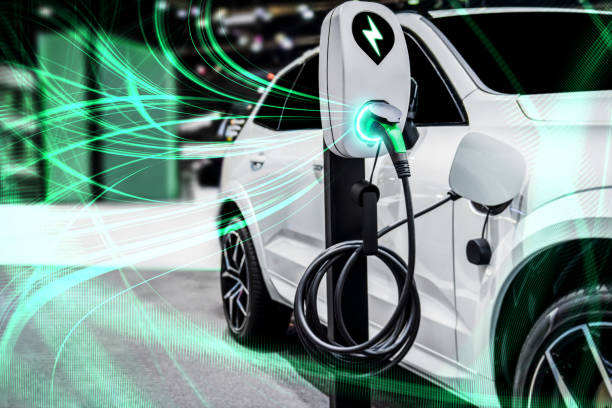Electric Vehicle Charging: Drive to a Gas Station? No Thanks!

Strong 8k brings an ultra-HD IPTV experience to your living room and your pocket.
Introduction:
The electric vehicle (EV) revolution is well underway, and as more consumers make the switch to EVs, the infrastructure to support this shift is expanding rapidly. One of the most significant factors in ensuring that EV adoption continues to grow is the availability and accessibility of charging stations. Unlike traditional gasoline-powered vehicles that rely on gas stations, EVs need charging stations equipped with efficient and reliable charging technology.
While EV charging stations have existed for years, they have undergone significant transformations in recent years due to advancements in technology. One of the most exciting developments is the integration of smart charging, powered by Artificial Intelligence (AI). As the world becomes increasingly connected and data-driven, AI is playing a pivotal role in reshaping how we charge our electric vehicles. In this article, we will explore how smart charging is transforming the EV charging experience, making it more efficient, cost-effective, and user-friendly.
Download FREE Sample of Artificial Intelligence Market
The Rise of Electric Vehicles
Electric vehicles have gained significant traction in recent years, thanks to their environmental benefits, lower operating costs, and advances in battery technology. As consumers look for cleaner alternatives to traditional internal combustion engine vehicles, the demand for EVs has surged. Governments and automakers are also pushing for the widespread adoption of EVs to meet sustainability targets, reduce carbon emissions, and combat climate change.
However, as the adoption of EVs continues to grow, so does the demand for EV charging infrastructure. The challenge lies in creating a network of charging stations that can meet the needs of an increasing number of EVs on the road. This has led to the emergence of smart charging solutions that leverage cutting-edge technology to optimize the charging process and address common challenges such as long charging times, energy demand, and grid capacity.
What Is Smart Charging?
Smart charging refers to the integration of advanced technologies like AI, machine learning (ML), and data analytics into the operation of EV charging stations. Unlike traditional charging stations that simply provide a power source for EVs, smart charging systems use AI to enhance the entire charging experience, from the user interface to grid management. These systems enable more efficient charging, reduce costs for both users and operators, and help balance the demand on the electrical grid.
In the context of EV charging, smart charging solutions can optimize charging times, monitor energy consumption, and ensure that charging is done in an eco-friendly and cost-effective manner. These technologies not only benefit EV owners but also provide charging station operators with the tools they need to improve service reliability, reduce downtime, and streamline operations.
How Artificial Intelligence is Transforming EV Charging Stations
Artificial Intelligence is playing an increasingly important role in making EV charging stations smarter, more reliable, and more efficient. AI systems are designed to make decisions based on data inputs and adapt to changing conditions in real time. When applied to EV charging, AI can significantly improve various aspects of the charging process. Below are some of the key ways in which AI is transforming EV charging stations:
1. Optimizing Charging Schedules
One of the main advantages of AI-powered smart charging is its ability to optimize charging schedules based on real-time demand, grid conditions, and energy pricing. EV owners can plug in their vehicles to charge, and AI systems will automatically adjust the charging speed and timing to avoid high-demand periods and lower costs.
For instance, AI can analyze grid load data to determine when electricity demand is low, allowing for EVs to charge during off-peak hours. This not only helps users save money on their electricity bills but also eases the strain on the electrical grid during peak hours. Charging during off-peak hours can lower energy costs and reduce the need for additional power plants to meet peak demand.
2. Predictive Maintenance
AI is also enhancing the predictive maintenance capabilities of EV charging stations. By continuously monitoring the performance of charging stations, AI systems can predict when a station might need maintenance or repairs. This reduces the likelihood of unexpected downtime and ensures that charging stations are always available when EV owners need them.
With machine learning algorithms, AI can detect patterns in the data collected from charging stations, identifying potential issues before they become critical. For example, if a charging port is showing signs of wear, the AI system can send an alert to the station operator, allowing them to perform maintenance before the station becomes unusable. Predictive maintenance ensures that charging stations operate reliably, minimizing disruptions to users.
3. Smart Grid Integration
As the number of EVs on the road grows, there is an increasing need for smart grid integration. A smart grid is an advanced electrical grid that uses digital technology to monitor and manage the flow of electricity. By connecting EV charging stations to the smart grid, AI systems can help ensure that charging activities are aligned with grid needs and reduce the strain on the overall electrical system.
AI-powered charging stations can communicate with the smart grid to determine when to charge EVs based on real-time grid conditions. For example, during periods of high grid demand, the charging system can delay charging or slow down the rate of charge to prevent overloading the grid. This integration ensures that EV charging is done in a way that is both efficient and sustainable, benefiting both users and the environment.
4. Personalized Charging Experience
AI also enhances the user experience by providing personalized charging recommendations. Smart charging systems can analyze an EV owner's charging habits, vehicle type, and driving patterns to suggest the most optimal charging schedules and locations. For example, if a driver typically charges their vehicle in the evening, the AI system can recommend a time when energy prices are lower, helping the driver save money.
Additionally, AI can optimize the charging process based on the specific needs of the vehicle. Different types of EVs have different battery capacities and charging requirements, and AI can ensure that the vehicle is charged efficiently without overcharging or undercharging, which can lead to battery degradation.
5. Energy Management and Load Balancing
Another critical aspect of smart charging is energy management and load balancing. In areas with limited grid capacity, AI can help prevent grid overload by balancing the charging demand across multiple charging stations. This can involve dynamically adjusting the charging rates of individual stations to ensure that the overall energy consumption stays within the grid's limits.
For example, AI can prioritize charging for vehicles that need to be charged soon while slowing down the charging rate for vehicles with a longer charging window. This ensures that all vehicles are charged while avoiding excessive demand on the local power grid. Load balancing helps maintain grid stability and ensures that charging stations can continue to provide service to EV owners without disruption.
6. Integrating Renewable Energy Sources
Many smart charging systems are also capable of integrating renewable energy sources such as solar or wind power into the charging process. AI can manage when to charge EVs using renewable energy, based on the availability of solar or wind power. This helps reduce the environmental impact of EV charging and further supports sustainability efforts.
For example, AI can control a network of charging stations equipped with solar panels, charging EVs during daylight hours when solar energy is abundant. This reduces the carbon footprint of the charging process and helps EV owners power their vehicles with cleaner energy.
The Future of Smart Charging: What’s Next?
The future of smart charging is bright, with AI set to continue playing a pivotal role in transforming the EV charging landscape. As the adoption of Electric Vehicles grows, so too will the demand for innovative charging solutions that are efficient, cost-effective, and sustainable. The integration of AI into charging stations is already providing significant benefits in terms of cost savings, efficiency, and sustainability, and these benefits will only expand as technology continues to evolve.
Download FREE Sample of Electric Vehicle Market
In the coming years, we can expect even more advanced features, such as the ability to charge EVs wirelessly, deeper integration with smart cities and home energy systems, and enhanced AI-driven analytics to predict and manage charging demand. As EVs become an integral part of our daily lives, the smart charging systems that support them will continue to evolve, ensuring that the transition to electric mobility is seamless and sustainable.
Conclusion
Electric vehicles are driving a clean, sustainable transportation future, and smart charging systems powered by artificial intelligence are at the heart of this revolution. AI is transforming EV charging stations by optimizing charging schedules, improving maintenance, integrating with smart grids, and providing a personalized user experience. As AI technology continues to advance, the EV charging landscape will become even more efficient, reliable, and environmentally friendly.
With smart charging, we are not just revolutionizing how we charge our cars—we are creating an infrastructure that can support the widespread adoption of electric vehicles, contributing to a greener, more sustainable future. The days of driving to a gas station for a fill-up are becoming a thing of the past. The future of transportation is electric, and it’s charging ahead with the help of AI.
Read the complete blog
Note: IndiBlogHub features both user-submitted and editorial content. We do not verify third-party contributions. Read our Disclaimer and Privacy Policyfor details.


